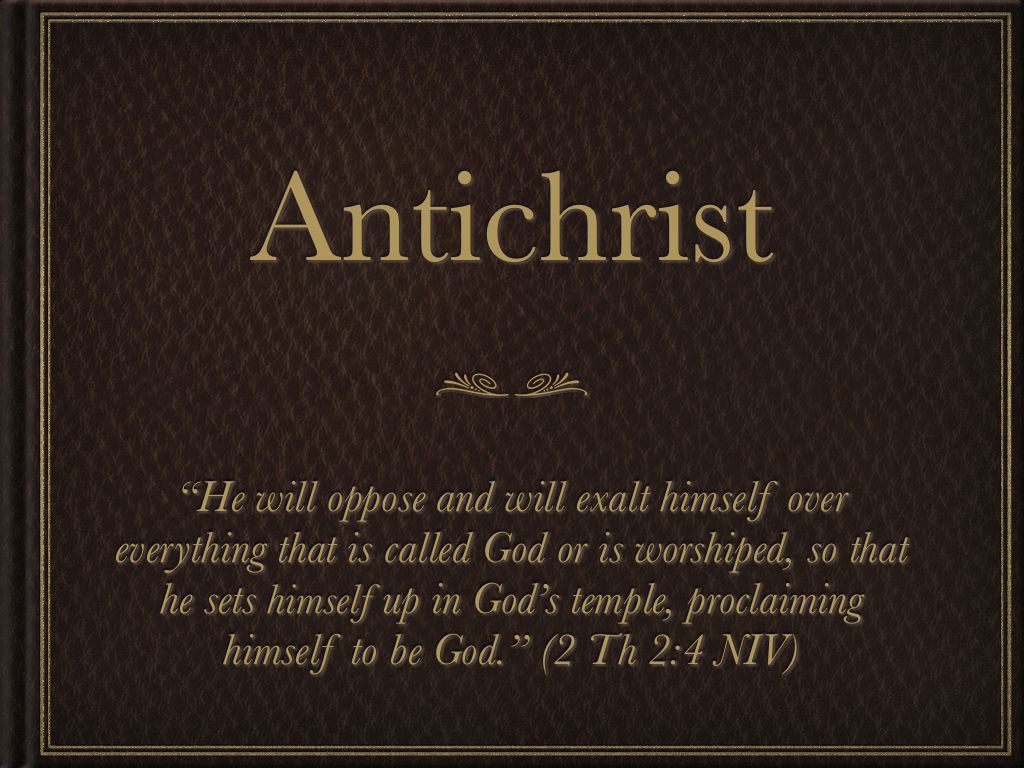The concept of the Antichrist has intrigued theologians, historians, and spiritual seekers for centuries. It represents one of the most debated and misunderstood topics in religious studies. As a central figure in various religious traditions, the Antichrist continues to captivate the imagination of people worldwide. This article aims to shed light on this enigmatic figure and explore its significance in modern times.
The Antichrist is often depicted as a symbol of opposition to divine will and righteousness. While interpretations may vary across different cultures and belief systems, its core representation remains consistent. Understanding the origins, characteristics, and implications of the Antichrist is crucial for anyone seeking deeper insight into religious texts and prophecies.
This article provides a thorough exploration of the Antichrist, covering its historical context, theological interpretations, and modern relevance. Whether you're a student of religion, a curious reader, or someone seeking clarity on this complex topic, this guide will equip you with valuable information and perspectives.
Read also:Mastering The Art Of Telephone Pranks Creative And Hilarious Ideas
Table of Contents
- The Origin of the Antichrist Concept
- Biblical Interpretation of Antichrist
- Historical Perspective on Antichrist
- Key Characteristics of the Antichrist
- Modern Views and Interpretations
- Common Myths About Antichrist
- Significance in Religious Context
- Antichrist Prophecies and Their Meaning
- Contemporary Debate Surrounding Antichrist
- Conclusion and Final Thoughts
The Origin of the Antichrist Concept
The idea of the Antichrist can be traced back to early Christian texts, particularly in the New Testament. The term "Antichrist" itself appears in the First and Second Epistles of John, where it is described as someone who denies the Father and the Son. These writings laid the foundation for future interpretations and discussions about this figure.
Historians and scholars suggest that the concept evolved over time, influenced by socio-political factors and religious conflicts. Early Christians often used the Antichrist as a metaphor for opposition to their faith, symbolizing the struggle between good and evil.
Early References to Antichrist
- First Epistle of John (2:18)
- Second Epistle of John (7)
- Revelation of John (13:18)
These references provide a glimpse into the theological framework surrounding the Antichrist, emphasizing its role as a symbol of spiritual deception and opposition.
Biblical Interpretation of Antichrist
The Bible offers several interpretations of the Antichrist, with varying degrees of detail and symbolism. In the Book of Revelation, for instance, the Antichrist is described as a beast with seven heads and ten horns, representing power and authority. This imagery has been the subject of much speculation and analysis over the centuries.
Additionally, the Apostle Paul's writings in 2 Thessalonians (2:3-4) describe the "man of lawlessness" who exalts himself above all that is called God. This passage is often associated with the Antichrist, further enriching the biblical narrative.
Key Biblical Passages
- 1 John 2:18-23
- 2 Thessalonians 2:3-4
- Revelation 13:1-18
These passages collectively contribute to the understanding of the Antichrist as a figure of immense power and deception, challenging the foundations of faith and morality.
Read also:What Time Does Luke Combs Concert Finish A Complete Guide For Fans
Historical Perspective on Antichrist
Throughout history, the concept of the Antichrist has been interpreted in various ways, reflecting the cultural and political contexts of different eras. During the Middle Ages, for example, many religious leaders identified political figures and rival religious groups as potential Antichrists. This practice served to reinforce religious authority and unify communities against perceived threats.
In more recent times, the Antichrist has been the subject of numerous literary works, films, and artistic expressions. These interpretations often reflect contemporary concerns and anxieties, highlighting the enduring relevance of this concept in modern society.
Historical Figures Linked to Antichrist
- Nero (Roman Emperor)
- Muhammad (in some medieval Christian writings)
- Various popes and political leaders
These associations demonstrate the flexibility of the Antichrist concept, allowing it to adapt to changing historical circumstances while maintaining its core meaning.
Key Characteristics of the Antichrist
The Antichrist is typically characterized by traits that oppose divine will and moral values. These include:
- Deception: The ability to mislead and manipulate others
- Power: Possessing immense authority and influence
- Arrogance: Exalting oneself above all forms of authority
- Opposition: Actively working against religious and moral principles
These characteristics are often used to warn believers of potential dangers and to encourage vigilance in distinguishing truth from falsehood.
Symbolic Representations
In art and literature, the Antichrist is frequently depicted through symbolic imagery. For example, the number 666, often associated with the Antichrist, is believed to represent imperfection and rebellion against divine order. Such symbols serve to reinforce the theological and moral lessons embedded in the concept.
Modern Views and Interpretations
In contemporary times, the Antichrist continues to be a topic of interest and debate. Modern interpretations often incorporate psychological, sociological, and philosophical perspectives, offering new insights into this ancient concept. Some scholars argue that the Antichrist can be seen as a metaphor for human tendencies toward greed, power, and self-destruction.
Additionally, the rise of technology and globalization has sparked discussions about the potential role of artificial intelligence and digital systems in fulfilling Antichrist prophecies. These interpretations reflect the evolving nature of human society and its relationship with technology.
Contemporary Concerns
- Technological advancements and their ethical implications
- Global political tensions and their impact on religious beliefs
- Cultural shifts and their influence on spiritual practices
By addressing these concerns, modern interpretations of the Antichrist provide valuable perspectives on the challenges facing humanity today.
Common Myths About Antichrist
Despite its theological significance, the Antichrist is often surrounded by myths and misconceptions. Some of the most common myths include:
- The Antichrist is a single individual destined to rule the world
- Only Christians will recognize the Antichrist
- The Antichrist will appear suddenly without warning
These myths can lead to confusion and misunderstanding, emphasizing the importance of accurate information and education on this topic.
Debunking Misconceptions
By examining the historical and theological context of the Antichrist, it becomes clear that many of these myths lack foundation. Instead, the Antichrist represents a broader concept of opposition to divine will and moral values, applicable to diverse cultures and belief systems.
Significance in Religious Context
The Antichrist holds significant importance in religious traditions, serving as a reminder of the ongoing struggle between good and evil. In Christianity, it represents the ultimate test of faith and commitment, urging believers to remain steadfast in the face of adversity. Similarly, other religious traditions may incorporate similar concepts, emphasizing the universal nature of this theme.
Through its symbolic representation, the Antichrist encourages reflection on personal beliefs and values, fostering a deeper understanding of one's spiritual journey.
Lessons for Believers
- Importance of discernment and critical thinking
- Value of community and shared faith
- Necessity of moral integrity and ethical behavior
These lessons highlight the practical applications of the Antichrist concept in everyday life, extending beyond mere theological speculation.
Antichrist Prophecies and Their Meaning
Prophecies related to the Antichrist are found in various religious texts, offering insights into its potential arrival and impact. These prophecies often emphasize the need for preparation and vigilance, encouraging believers to remain grounded in their faith. While interpretations may vary, the underlying message remains consistent: the Antichrist represents a challenge to spiritual and moral values.
By studying these prophecies, individuals can gain a better understanding of their historical and theological significance, as well as their relevance in modern times.
Key Prophecies
- Daniel 7:21-26
- Revelation 17:8-14
- Matthew 24:4-5
These prophecies collectively contribute to the rich tapestry of beliefs surrounding the Antichrist, providing valuable context for its interpretation and application.
Contemporary Debate Surrounding Antichrist
Today, the Antichrist remains a subject of debate among theologians, historians, and spiritual seekers. Some argue that the concept is outdated and irrelevant in modern society, while others believe it continues to hold profound significance. These differing perspectives reflect the dynamic nature of religious beliefs and their adaptation to changing times.
Engaging in open and respectful dialogue about the Antichrist can foster greater understanding and appreciation for diverse viewpoints, enriching the collective knowledge and wisdom of humanity.
Encouraging Constructive Discussion
By promoting informed discussions and encouraging critical thinking, individuals can contribute to a deeper understanding of the Antichrist concept. This approach not only enhances personal knowledge but also strengthens the broader community's ability to address complex issues with empathy and insight.
Conclusion and Final Thoughts
In conclusion, the Antichrist represents a fascinating and complex concept with deep roots in religious and cultural traditions. Through its exploration, we gain valuable insights into the nature of faith, morality, and human experience. Whether viewed as a literal figure or a symbolic representation, the Antichrist continues to inspire thought and reflection across generations.
We invite you to share your thoughts and engage in meaningful discussions about this topic. Feel free to leave a comment or explore other articles on our website for further insights into related subjects. Together, we can deepen our understanding and appreciation of the rich tapestry of human beliefs and values.
References:
- Bible Gateway. (n.d.). Retrieved from https://www.biblegateway.com
- Encyclopedia Britannica. (n.d.). Antichrist. Retrieved from https://www.britannica.com/topic/Antichrist
- HarperCollins Publishers. (2020). The Oxford Dictionary of the Christian Church.


